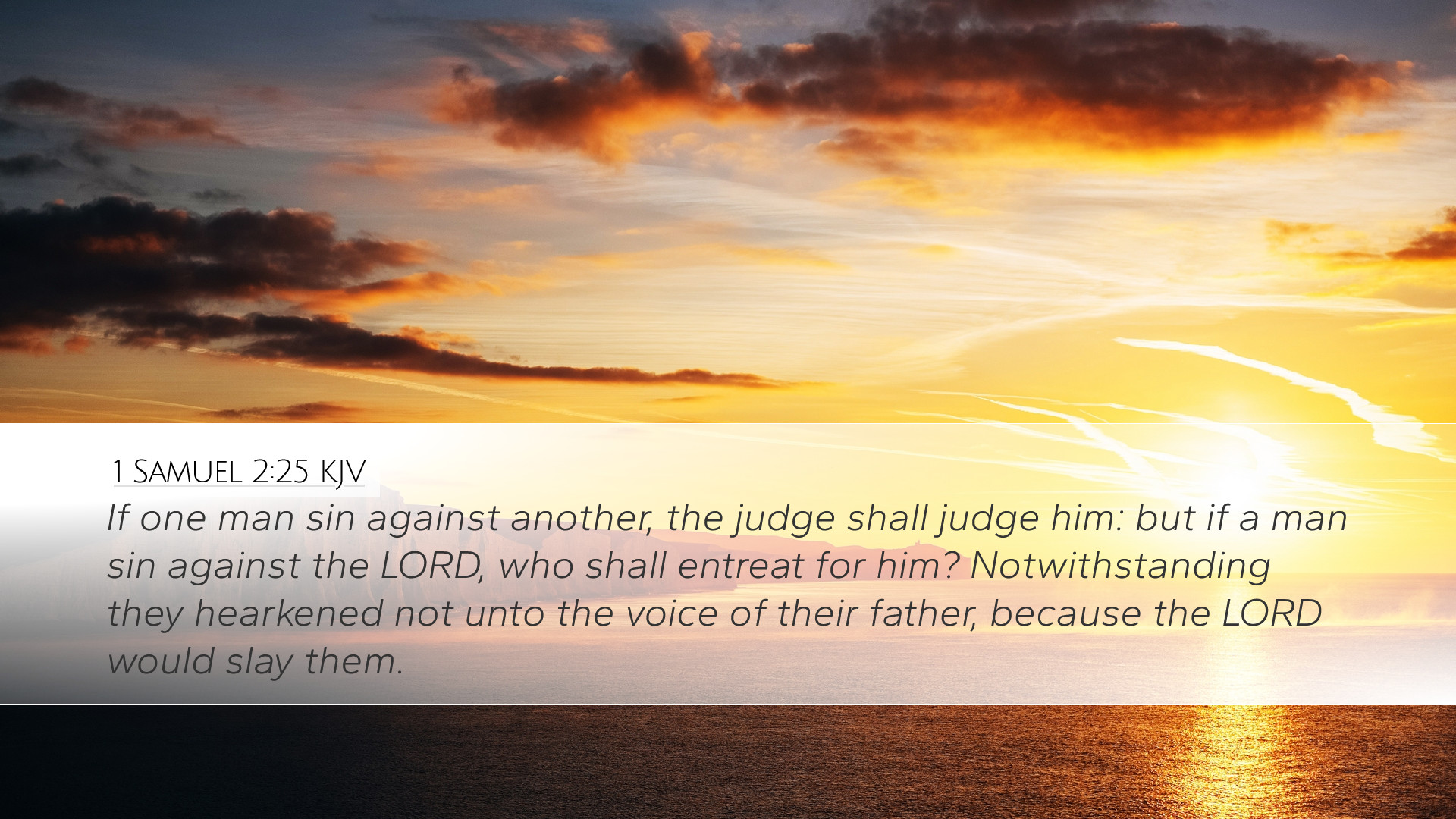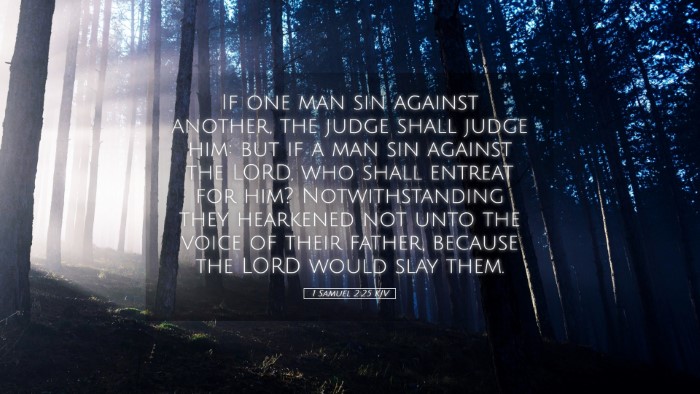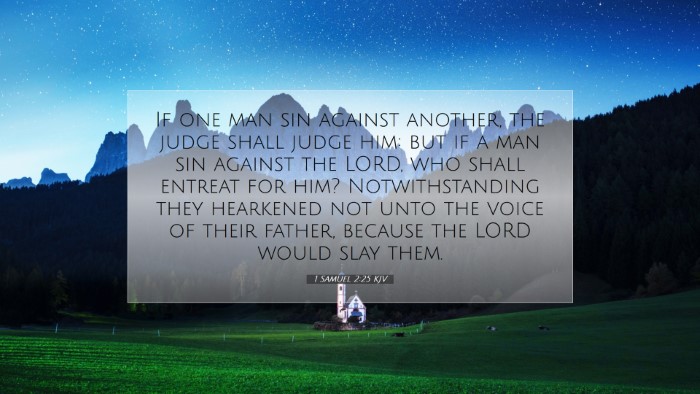Commentary on 1 Samuel 2:25
Verse: "If one man sin against another, the judge shall judge him: but if a man sin against the Lord, who shall intreat for him? Notwithstanding, they hearkened not unto the voice of their father, because the Lord would slay them."
Introduction
The verse in question, 1 Samuel 2:25, presents profound insights into the nature of sin and the judgment of God. It reflects a critical moment during the time of Eli’s priesthood and challenges the moral and spiritual condition of Israel. The teachings derived from this verse are foundational for understanding divine judgment and intercession.
Contextual Analysis
This passage occurs in a broader narrative where the actions of Eli’s sons, Hophni and Phinehas, are under review. Their sinful behavior is a significant concern, leading to God's eventual judgment. Therefore, it is crucial to interpret this verse against the backdrop of these actions and the spiritual decay they represent in Israel.
Insights from Matthew Henry
Matthew Henry emphasizes the gravity of sinning against God compared to sinning against fellow humans. He notes:
- Sins Against Men: These can often be reconciled through human judgment and restoration, suggesting a measure of agency in addressing wrongs done between individuals.
- Sins Against God: Conversely, Henry points out that the sins committed against the Lord have eternal ramifications. He questions who can intercede for those who transgress against divine commandments.
Henry also discusses the response of Eli's sons to their father, indicating that their rejection of paternal guidance was not merely familial disobedience but a reflection of their hardened hearts towards God. This sentiment illustrates a lack of humility and a severe disregard for divine authority.
Insights from Albert Barnes
Albert Barnes elaborates on the judicial implications found in this verse. He writes:
- Judicial Accountability: Barnes articulates that when one sins against another, human systems of justice can enact punishment. However, sinning against God presents a unique dilemma.
- Intercession and Justice: He stresses the absence of a mediator for those who offend against God, underlining the seriousness of sin. The gravity of estrangement from God means that no earthly pleas can amend the divine breach that results from such sin.
Moreover, Barnes reinforces the idea that sometimes God permits individuals to continue in their sinful ways, revealing a divine foreknowledge of their ultimate fate—a point echoed in the phrase, "because the Lord would slay them." This divine judgment is not arbitrary but rooted in God's righteousness and justice.
Insights from Adam Clarke
Adam Clarke focuses on the implications of sinning against God, noting:
- The Role of an Intercessor: Clarke acknowledges the absence of intercessors, which evokes the need for a mediator in the Christian context—culminating in Christ, the ultimate intercessor.
- Divine Sovereignty: His commentary suggests that God’s sovereignty is paramount, and His decisions regarding judgment stem not from capriciousness but from holiness and justice.
Clarke draws upon the concept that sin against God alters an individual's standing and relationship with the Creator. When humans neglect their duties and continue in sin, as Eli's sons did, they operate under a false sense of security, failing to recognize the seriousness of their actions.
Theological Implications
This verse has significant theological bearings that extend to contemporary understanding:
- Sin and Divine Judgment: The passage underscores the reality that while societal repercussions exist for wrongs committed between individuals, disregard for divine laws invites dire consequences.
- The Need for Mediation: The lack of an intercessor depicted in this verse raises crucial questions about the nature of mediation. In Christian theology, this resonates with the role of Jesus Christ, who intercedes on behalf of humanity.
- Spiritual Blindness: The refusal of Eli's sons to heed their father's warnings reflects spiritual blindness, which is a theme echoed throughout scripture. It serves as a warning to modern readers about the peril of turning a deaf ear to divine admonition.
Lessons for Pastors, Students, and Scholars
For pastors and spiritual leaders, this verse serves as a reminder of the serious responsibility they bear in guiding their congregations towards righteousness.
- Moral Accountability: Pastoral leaders are called to model integrity and teach their flock about the weight of sin and the importance of repentance.
- Intercessory Prayer: This verse invites reflection on the gifts of intercession, encouraging leaders to pray earnestly for those who stray from the path of righteousness.
Students and scholars are encouraged to delve deeper into this text, exploring its implications on human sinfulness and divine justice. They are urged to consider the relevance of intercession in the light of Christ and how it contrasts with the despair evident in the absence of mediation as noted in the narrative.
Conclusion
1 Samuel 2:25 offers a significant lens through which to understand the nature of sin and judgment before God. It serves as an exhortation to the faithful, warning against the dangers of complacency and disobedience to divine authority. As we reflect upon this text, may we come to appreciate the depth of God’s justice and mercy, recognizing Christ as our ultimate advocate.


